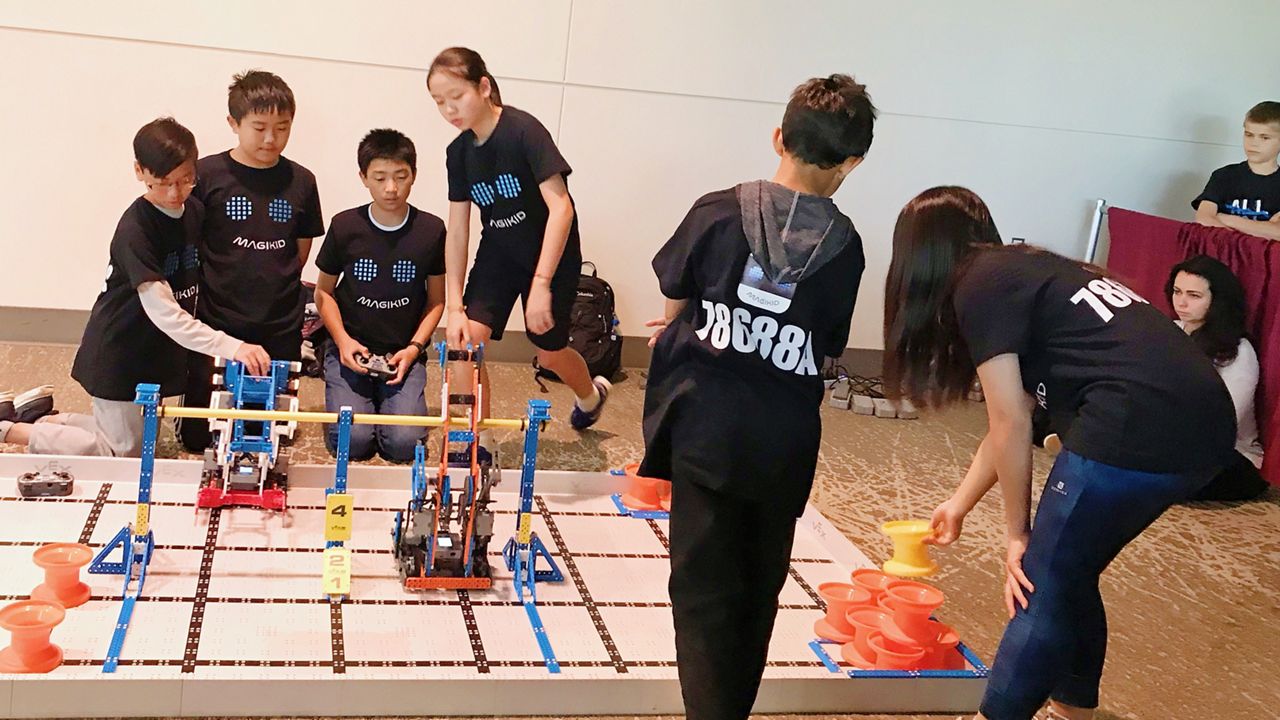IRVINE, Calif. — When Wenjin Liang remembers her first look at a Magikid Robotics Lab, she sees ear-to-ear smiles and bright eyes.
Just before her 2016 visit, Liang had come across the robotics school at a Los Angeles convention. She was there looking for a way to gently introduce her 4-year-old daughter to robotics and coding. She hoped to find something educational, interactive and engaging.
“I’m just a normal mom,” Liang, 39, said. “I just wanted to find something for my daughter.”
During her visit, she was sold. Liang, who earned a Master of Business Administration at USC, saw a model with real upside. A method of learning that children loved was sure to have a market, she thought.
Years later, and fresh off a pandemic, Liang is in her third year as the company’s first franchisee. Her school, located at 4662 Barranca Parkway in Irvine, has been hit hard. Shelter-in-place orders decimated her business and reduced her staff of roughly 20 teachers to just four.
The program aims to show students the fundamentals so they can come up with their own creative solutions. Kids work their way through basic programming interfaces, and they’re presented with tasks.
Students have to assemble a robot that can move an object across a table or similar problems. At their fingertips are parts, a motor, sensors, batteries and whatever else they need to accomplish the lesson.
The teaching methods, alien to the rote memorization of yesteryear, yet a spiritual descendant of the engagement of Benjamin Franklin’s “Poor Richard’s Almanac,” are in vogue. Liang said this kind of teaching can push students away from empty calorie activities on tablets or smartphones to something smart and educational.
On a Venn diagram of markets, Magikid crosses into edutainment — education/entertainment — and an in-person learning model.
USC professor Alan Arkatov, who has served on the California Board of Education, said any education business has to be sustainable, scalable and quantifiable.
It’s a crowded, multi-billion dollar market with global players and stout local competitors with matured networks and connections to public education.
“Tutoring was a huge franchise model but the ability to go online changes everything,” Arkatov said.
Magikid, which has locations around the globe, has dabbled in that market during the pandemic, switching to online tutoring until it can return to its in-person model. But Liang said her franchise is focused on getting students back into the school.
Other potential competitors include companies like Hopscotch, a programming game featured on “Shark Tank.” That, and other products, can be done at home.
But more direct competition comes from other franchise, brick-and-mortar tutor or lesson-based companies. Among them is Kumon, which focuses on enhancing math and reading in a study-hall format where students work individually and consult help as needed. One of the major competitors in Southern California is Sylvan Learning.
Magikid sits at the intersection of a global market numbering in the hundreds of billions and some parents’ anxiety over how much learning their children have lost.
“There’s a $122 billion money train coming east to west,” said Arkatov. “When you have giant tidal waves of money coming, sometimes it gets used well and sometimes it doesn’t.”
With money to spend on beefing up education offerings, Arkatov said after-school programs could be prime for a cash infusion.
Liang said her plan over the past year was to make inroads with Irvine Unified School district. Those plans were stalled by the pandemic, but still on deck, she said. Now, she’s rebuilding her staff, mostly made up of engineering students.
That means she’s focusing on parent outreach and continuing to develop existing relationships.
“They all believe technology is the future, and they won’t just wait for that day to come,” Liang said.



